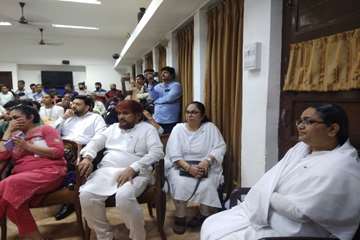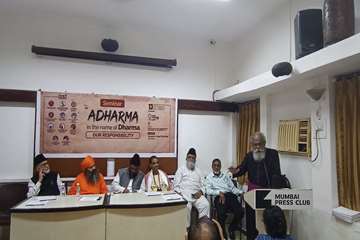Religious leaders’ seminar looks at ‘dharma’ in ‘times of intolerance’
Religious leaders’ seminar looks at ‘dharma’ in ‘times of intolerance’
Leaders from several religious communities talked about the meaning and significance of ‘dharma’. Baba Satyanamdas from Udasin Ashram, Goregaon, said, “At present, the situation in our country is bad. ‘Sanatan dharm’ is against violence, and it respects women…” Maulana Mahmood Daryabadi, General Secretary of All India Ulema Council, said, “We plan to go to every locality and spread our message of peace.”
.jpeg)
Leaders from several religious communities talked about the meaning and significance of ‘dharma’. Baba Satyanamdas from Udasin Ashram, Goregaon, said, “At present, the situation in our country is bad. ‘Sanatan dharm’ is against violence, and it respects women…” Maulana Mahmood Daryabadi, General Secretary of All India Ulema Council, said, “We plan to go to every locality and spread our message of peace.”
The seminar called ‘Adharma in the name of dharma’ was organised by Shakir Shaikh and Farid Shaikh from Aman O Insaf Morcha, a group of learned Muslim religious leaders and activists. It was held at the Mumbai Press Club.
The seminar began with a line from the Brihadaranyaka Upanishad: ‘Wars begin in the minds first.’ Sister Tapaswini Brahma Kumari further elaborated, “Jo humari mann ki avastha hoti hai, aisi hi bahar ki vyavasta hoti hai (Our state of mind reflects in our environment).”
Sister Tapaswini pointed out that if one’s mind was not at peace, it was impossible to keep one’s “home environment” peaceful. “And by ‘home environment’ I mean not just our individual homes but the society and the world we live in,” she said.
,” she said. “When we are at peace with ourselves, we can bring peace to others. We need to recognise the fact that real human nature is to be joyous, peaceful, loving, pure and knowledgeable. Just like a thirsty person reaches out for water, when we see adharma happening, our dharma is to reach out and spread the peace that resides within.”
Maulana Zaheer Abbas Rizvi, vice-president of the All India Shia Personal Board, said that he totally concurred with Sister Tapaswini’s views about listening to one’s inner consciousness. “We call it ‘nabz ko pehchanna’ or recognising the consciousness within,” he said. “There are a lot of similarities in our core message, and if we continue to meet on such platforms our issues will be resolved.”
Maulana Rizvi said that people were unable to comprehend what dharma and adharma were in these polarised times. “We are so engrossed in this political environment of polarisation that we are unable to understand the purpose of our existence. The day we do that, we will treat each other with respect,” he said.
Maulana Rizvi cited the example of blood donation. “This blood has no caste or religion,” he said, “and this blood wasn’t meant to be wasted by taking lives. It is meant only to save lives. We need each other. You protect us and we will protect you. When people realise this simple thing, the walls of hate erected by vote bank politics will crumble on their own.”
Baba Satyanamdas of the Udasin Ashram in Goregaon said that the biggest dharma was to follow the path of humanity. “Merely visiting temples or going to mosques for namaaz isn’t enough,” he said. “We have to work shoulder to shoulder to break down the walls of hatred. We are not united, and that is why we are facing this situation. There is a divide-and-rule policy being perpetrated by the kaale angrez (black British). If we could make the gore angrez (white British) flee India after 200 years of rule, fighting the kaale angrez, who divide people on religious lines, is child’s play.”
Dr Mukunda Madhava Das, vice-president at ISKCON, Mumbai, said that it was important to understand what dharma was. “It is a Sanskrit word with a broader and deeper meaning,” he said. “The dharma of water is to quench our thirst. The solid state of water, when it is frozen, isn’t the real nature of water. Likewise, in humans, our nature is to follow our real dharma.
“Dharma also means duty,” continued Dr Das. “Duty towards one’s family, one’s society. If one becomes selfish and loves only one’s family, it makes room for selfishness and hatred. But if one considers the entire world as one family (vasudeva kutumbakam), one will understand what it is to be really dharmic.”

.jpeg)
.jpeg)


Write your comment.